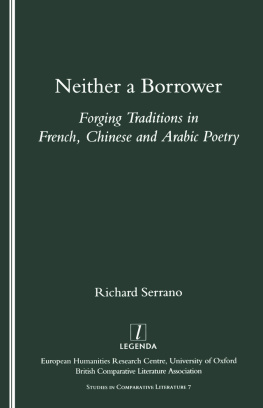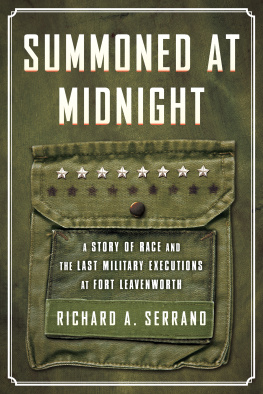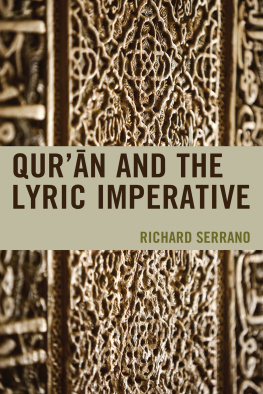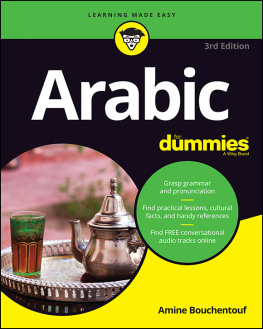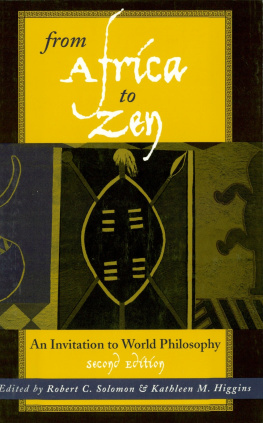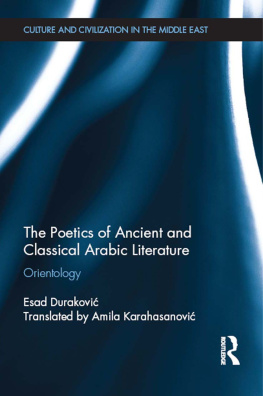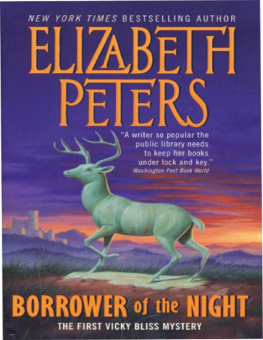Serrano - Neither a borrower: forging traditions in French, Chinese and Arabic poetry
Here you can read online Serrano - Neither a borrower: forging traditions in French, Chinese and Arabic poetry full text of the book (entire story) in english for free. Download pdf and epub, get meaning, cover and reviews about this ebook. City: Abingdon;Oxon, year: 2017, publisher: Taylor & Francis (CAM);Routledge, genre: Detective and thriller. Description of the work, (preface) as well as reviews are available. Best literature library LitArk.com created for fans of good reading and offers a wide selection of genres:
Romance novel
Science fiction
Adventure
Detective
Science
History
Home and family
Prose
Art
Politics
Computer
Non-fiction
Religion
Business
Children
Humor
Choose a favorite category and find really read worthwhile books. Enjoy immersion in the world of imagination, feel the emotions of the characters or learn something new for yourself, make an fascinating discovery.
- Book:Neither a borrower: forging traditions in French, Chinese and Arabic poetry
- Author:
- Publisher:Taylor & Francis (CAM);Routledge
- Genre:
- Year:2017
- City:Abingdon;Oxon
- Rating:5 / 5
- Favourites:Add to favourites
- Your mark:
- 100
- 1
- 2
- 3
- 4
- 5
Neither a borrower: forging traditions in French, Chinese and Arabic poetry: summary, description and annotation
We offer to read an annotation, description, summary or preface (depends on what the author of the book "Neither a borrower: forging traditions in French, Chinese and Arabic poetry" wrote himself). If you haven't found the necessary information about the book — write in the comments, we will try to find it.
Serrano: author's other books
Who wrote Neither a borrower: forging traditions in French, Chinese and Arabic poetry? Find out the surname, the name of the author of the book and a list of all author's works by series.
Neither a borrower: forging traditions in French, Chinese and Arabic poetry — read online for free the complete book (whole text) full work
Below is the text of the book, divided by pages. System saving the place of the last page read, allows you to conveniently read the book "Neither a borrower: forging traditions in French, Chinese and Arabic poetry" online for free, without having to search again every time where you left off. Put a bookmark, and you can go to the page where you finished reading at any time.
Font size:
Interval:
Bookmark:

NEITHER A BORROWER FORGING TRADITIONS IN FRENCH, CHINESE AND ARABIC POETRY
UNIVERSITY OF OXFORD
The European Humanities Research Centre of the University of Oxford organizes a range of academic activities, including conferences and workshops, and publishes scholarly works under its own imprint, LEGENDA. Within Oxford, the EHRC bridges, at the research level, the main Humanities faculties: Modern Languages, English, Modern History, Classics and Philosophy, and Music and Theology. The Centre facilitates interdisciplinary research collaboration throughout these subject areas and provides an Oxford base for advanced researchers in the Humanities.
The Centres publications programme focuses on making available the results of advanced research in medieval and modern languages and related interdisciplinary areas. An Editorial Board, whose members are drawn from across the British university system, covers the principal European languages and literatures. The legenda list currently includes works on Arabic, Catalan, Chinese, English, French, German, Italian, Portuguese, Russian, Spanish and Yiddish literature. In addition, the EHRC co-publishes with the Society for French Studies, the Modern Humanities Research Association and the British Comparative Literature Association. The Centre publishes a Special Lecture Series under the Legenda imprint, and the journal Oxford German Studies.
Enquiries about the Centre's publishing activities should be addressed to:
Professor Malcolm Bowie, Director
Further information:
Kareni Bannister, Senior Publications Officer
European Humanities Research Centre
University of Oxford
47 Wellington Square, Oxford OXi 2JF
enquiries@ehrc.ox.ac.uk
www.ehrc.ox.ac.uk
Chairman
Professor Malcolm Bowie, All Souls College
Editorial Coordinator for French
Dr Nicola Luckhurst, Somerville College
Professor Ian Maclean, All Souls College (French)
Professor Marian Hobson Jeanneret, Queen Mary University of London (French)
Professor Ritchie Robertson, St John's College (German)
Professor Lesley Sharpe, University of Bristol (German)
Dr Diego Zancani, Balliol College (Italian)
Professor David Robey, University of Reading (Italian)
Dr Stephen Parkinson, Linacre College (Portuguese)
Professor Helder Macedo, King's College London (Portuguese)
Professor Gerald Smith, New College (Russian)
Professor David Shepherd, University of Sheffield (Russian)
Dr David Pattison, Magdalen College (Spanish)
Dr Alison Sinclair, Clare College, Cambridge (Spanish)
Dr Elinor Shaffer, School of Advanced Study, London (Comparative Literature)
Studies in Comparative Literature Editorial Committee
Professor Peter France, University of Edinburgh (Chairman)
Professor Stephen Bann, University of Kent
Dr Elinor Shaffer, School of Advanced Study, London
Senior Publications Officer
Kareni Bannister
Publications Officer
Dr Graham Nelson
LEGENDA
EUROPEAN HUMANITIES RESEARCH CENTRE STUDIES IN COMPARATIVE LITERATURE 7
Forging Traditions in French, Chinese and Arabic Poetry
Richard Serrano

First published 2002
Published by the European Humanities Research Centre of the University of Oxford 47 Wellington Square Oxford OX1 2JF
In association with the British Comparative Literature Association
LEGENDA is the publications imprint of the European Humanities Research Centre
Published 2017 by Routledge
2 Park Square, Milton Park, Abingdon, Oxon OX14 4RN
711 Third Avenue, New York, NY 10017, USA
Routledge is an imprint of the Taylor & Francis Group, an informa business
European Humanities Research Centre of the University of Oxford 2002
ISBN 13: 978-1-900755-60-3 (pbk)
All rights reserved. No part of this publication may be reproduced or disseminated or transmitted in any form or by any means, electronic, mechanical, photocopying, recording or otherwise, or stored in any retrieval system, or otherwise used in any manner whatsoever without the express permission of the copyright owner
British Library Cataloguing in Publication Data
A CIP catalogue record for this book is available from the British Library
LEGENDA series designed by Cox Design Partnership, Witney, Oxon
Copy-Editor: Dr Leofranc Holford-Strevens
I am grateful to Malcolm Bowie, Nicola Luckhurst, Karem Bannister and Graham Nelson of Legenda, as well as the two anonymous and insightful readers, for making this book possible. Portions of the first chapter appeared in different form as 'Al-Butur's Poetics of Persian Abodes' in the Journal of Arabic Literature 28 (1997). Part of the sixth chapter appeared in telescoped form as 'Fans, Silks, and Ptyx: Mallarm and Classical Chinese Poetry', Comparative Literature 50/3 (summer 1998). I am grateful to both publications for permission to reuse this material.
The writing of this book spans my years of teaching at three institutions. It would have been impossible without the assistance of all the people mentioned below.
I thank the following friends and colleagues at the University of California at Berkeley: Vincent Kaufmann, for believing in the project long before it made any sense; Ann Smock, for pointing out this book's shortcomings in a manner yet more urgent for its kindness; Bill Smock, for his persistent criticism and appreciation of absurdity; Kenneth Weisinger. for gentle remonstrations; James Monroe, for being my most particular reader and most vocal supporter; Kathryn Kaufmann, for her wit and patience; Adnan Husain, for the conversations that eventually caused me to rewrite every sentence; the staff of the Department of Comparative Literature, Marianne Callum, Vicky Yost and Christina Willerup, who made attending graduate school feel like being part of an unnaturally happy family; and to the other colleagues who started me on that odyssey which finally landed me in a safe haven, the Rutgers University French Department.
I thank the following friends and colleagues at Columbia University: the Board of Directors of the Society of Fellows in the Humanities for generously providing two years of support in the form of a Mellon Fellowship; Marsha Manns, the Director of the Society of Fellows, who first made me realize that I belonged there; my fellow fellows Anne Waters, Linda Przybyszewski, Martha F. Ann Selby and Wendy Heller, whose work encouraged me to push the limits of my own; Kathy Eden, for being everything that a scholar and teacher should be; the staff of the Columbia University libraries for endless patience, especially Trevor Dawes, Melissa Springs and Mayra Melendez.
Although this book was nearly finished when I joined the Rutgers University French Department, the final sprint was possible only because the generosity, patience and integrity of my new colleagues and our formidable support staff made me again realize the value of collegiality, rigorous scholarship and joyous teaching. A special thanks to my colleague and friend Mary Shaw for her comments on the Mallarm chapter and for suggesting I send the manuscript to Legenda.
There remain a few people who do not fit into any of the above categories. Diane Middlebrook of Stanford University who first inspired me to read, really read. Suzanne Stetkevych of Indiana University gave marvellous comments on the Butur chapter. Terri de Young of the University of Washington made helpful observations on the Srat Ysuf chapter. Pauline Yu of the University of California at Los Angeles graciously agreed to read the Chinese chapters at very short notice. Marilyn McQuown never quit asking when it would be finished. Ilse Haag provided the guardian angel to watch over the project. My aunt, Doris Costales, and my grandmother, Virginia Miller, deserve thanks beyond the scope of these acknowledgements. Finally, thanks to my mother, Juanita Serrano, for whom this book, and all others to come, is written.
Font size:
Interval:
Bookmark:
Similar books «Neither a borrower: forging traditions in French, Chinese and Arabic poetry»
Look at similar books to Neither a borrower: forging traditions in French, Chinese and Arabic poetry. We have selected literature similar in name and meaning in the hope of providing readers with more options to find new, interesting, not yet read works.
Discussion, reviews of the book Neither a borrower: forging traditions in French, Chinese and Arabic poetry and just readers' own opinions. Leave your comments, write what you think about the work, its meaning or the main characters. Specify what exactly you liked and what you didn't like, and why you think so.

